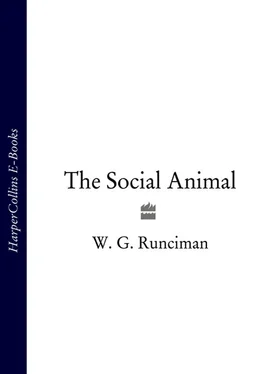The same distinction can be made on topics which fall more nearly within the domain of one of the specialized social sciences. If, for example, you are an economist studying the automobile industry, you may want to know about the initial commercial exploitation of the internal combustion engine, in which case you will need to find out about the cost – benefit calculations which showed it to be worthwhile. Or you may want to know about the appeal of the product to its potential purchasers, in which case you will need to find out about not only its utility as a mode of transport but also the effect of advertising in expanding consumer demand for it and the part played by peer-group imitation or rivalry in raising its priority as an item of household expenditure. Or you may want to know why some manufacturers have been more successful than others, in which case you will need to find out about production techniques, marketing strategies, tariff barriers, and rates of technological innovation and obsolescence. Indeed, you may well want to draw directly on models derived from the theory of natural selection, as a number of economists have done, in order to explain why some particular firms and their particular products win out over others in competition for market share. 18
These examples can also be used (as the handshake example can) to illustrate the difference between the approaches of sociologists or anthropologists on the one hand and historians on the other. There is a familiar contrast, much discussed by philosophers of social science, between narrative explanations (‘because he couldn’t find a horse, the King of Ruritania lost the battle and therefore his kingdom’) and lawlike explanations (‘all monarchies, including the Ruritanian, depend on some kind of religious legitimation’). But the contrast mustn’t be overdrawn. Narrative explanations presuppose underlying regularities of certain kinds which must be true if the particular chain of causal connections is to hold; lawlike explanations are valid across the range of instances to which they are applied only if specific historical conditions are presupposed too. Lack of a horse only leads to the loss of a kingdom in a context to which implicit generalizations about certain forms of warfare apply, just as religious legitimation of a monarchy can only come about after a series of events which were contingently sufficient for it to do so. Sociologists, it could accordingly be said, are all closet historians (and historians closet sociologists).
For example: Madagascar is an exceptionally interesting area to study, not only because it is an island but because, over the course of the past 200 years, a network of small, scattered kingdoms has been replaced, first, by a central bureaucratic state employing slave labour, second, by a colonial regime which abolished slavery at the same time as imposing its own political institutions, and third, by a post-colonial government serviced by a professional, administrative and commercial bourgeoisie. This intriguing evolutionary pattern, convincingly analysed in the work of the anthropologist Maurice Bloch, presents a wide range of different contrasts which call for a correspondingly wide range of explanatory hypotheses. But if your interest is in the first of the three transitions, you will find yourself drawn to the particular sequence of events whereby a particular nineteenth-century king, having captured a sufficient number of slaves to exploit to the full the rice-growing potential of a particular territory, was able to exchange the surplus for European weapons which had by then become available and with them to capture yet more slaves and thereby build up a momentum of conquest which put his kingdom in control of the whole of Madagascar. 19 This is not only a textbook example of a narrative explanation; it also tells specifically against a would-be lawlike one since any generalization of the form of ‘whenever one of a number of competing states gains priority of access to more advanced military technology it will establish a momentum of conquest sufficient to guarantee victory’ can be demolished by counter-examples from other times and places where the other conditions which were necessary in the case of Madagascar failed to obtain.
But suppose that your interest is not in the political history of Madagascar, but on the contrary in the patterns of traditional social behaviour which have persisted throughout the successive changes of regime. Bloch draws attention to the persistence of a ritual of circumcision in which the ceremony is performed and the traditional blessing given by a chosen ‘elder’. 20 He holds that in Madagascar, as elsewhere, such rituals are a function of institutionalized inequality, and is therefore unsurprised that the role of the persons chosen as ‘elders’ under each successive regime should turn out to be constant not in its defining practices but in its rank: in the first period, the ceremony is performed by local kinship group elders; in the second, by royal administrators; in the third, by French colonial officials; and in the fourth, by prominent local capitalists. QED. Notice, however, that he is explicitly not processing a lawlike generalization of the form of ‘the amount of ritual communication in a society varies with the social distance between its constituent roles’. What he says is that institutionalized inequality is what rituals like this one are about. To explain them, accordingly, involves an analysis of both the meaning of the ritual to the participants and the features of the history and culture of Madagascar which account for the successive replacement of one kind of ‘elder’ by another. And yes, there is a valid generalization which can be framed, if you want it, to the effect that people prefer their domestic ceremonies presided over by persons of higher rather than lower rank. Would any professor of anthropology be flattered to have his or her inaugural lecture chaired not, as advertised, by the university vice-chancellor in academic robes, but by a bare-footed freshman in an unwashed T-shirt?
All this, however, brings us back to the need for genetic, motivational and functional explanation in the study of human social behaviour. For example: in many different societies, there are communities and subcultures where the advantages of behaviour which the dominant ideology defines as ‘criminal’ outweigh the disadvantages. Parts of London and Newcastle, as of Chicago and Los Angeles, are obvious examples. Able-bodied young males are likely to be at least part-time occupants and performers of the role of ‘thief’: the chances of being caught are small, there is no alternative employment on offer which is both legitimate and gainful, there are easy pickings in the more affluent community down the road, and so on. Yes, but why exactly do they do it? Is it through rational choice, unthinking conformity to the peer-group, class or ethnic hatred, innate predisposition, an urge to escape from boredom, pathological greed, or what? However obvious the function, we still want to know why those who do it do and those who don’t don’t, and which of the relevant features of the environment would need to be changed for those who do not to want to any longer. It still isn’t a question to be answered by taking their own account of why they do it at face value: if, for example, they say that they do it because they are driven to it by poverty, the street-wise sociologist will wait for evidence of their changing their thieving behaviour when they cease to be poor. But don’t we still want to know what motivates them to do it as well as how they started and what they get out of it? Of course we do.
Ideally, therefore, the explanation of an observed pattern of human social behaviour will not only link a motivational to both a genetic and a functional hypothesis but provide a theoretical underpinning for all three. You don’t need a sociology degree before you notice that young men are more aggressive than elderly women. But maybe you do need a sociology degree (with some biology and psychology courses thrown in) before you can produce an adequate answer to the question: why does what looks like a causal connection between young maleness and a propensity to violence hold good? We need not just the evidence which might, but doesn’t, invalidate the claim that the connection is causal. We also need an explanation for the explanation. To take a textbook example from physical science, the discovery of a causal connection between altitude above sea level and the boiling point of water was made long before the notion of atmospheric pressure provided the theoretical grounding for it. In sociology, we are still a long way from the sort of grounding of wide-ranging causal hypotheses in deep and powerful theories which has been achieved in both physical and biological science. But that’s part of what makes it such a fascinating subject to pursue. Whatever (exactly) it is that you want to know, there is plenty left to find out about how we all behave as social animals, and there are plenty of alternative hypotheses available to explain it when you do.
Читать дальше




![О Генри - Социальный треугольник [The Social Triangle]](/books/405340/o-genri-socialnyj-treugolnik-the-social-triangl-thumb.webp)







